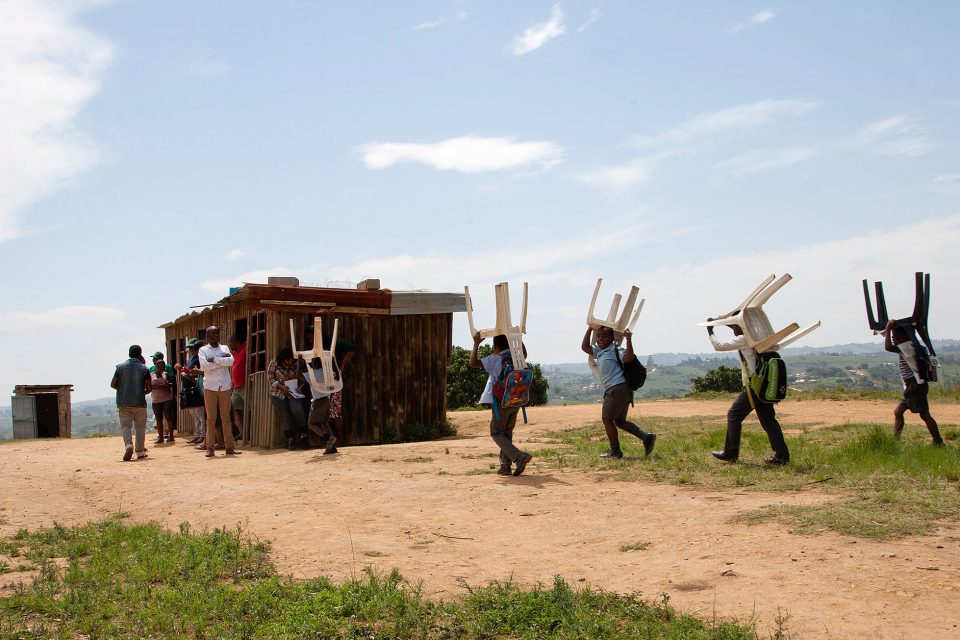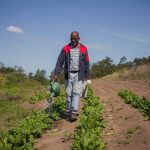Traditional leader halts Ndwedwe development
Residents of Ndwedwe are battling the local inkosi, who has stopped a R40 million project from going ahead in the area, frustrating hopes of jobs and better schools.
Author:
19 November 2019

Sitting under a tree shielding the KwaMkhabela spaza shop along the P100 main road in Ndwedwe, Bishop Bheki Ngcobo has run out of patience with the local inkosi.
He is not alone. Many residents and community members claim that Inkosi Nduduzo Ngcobo is the reason this picturesque village situated not too far from the Hazelmere Dam near Verulam, north of Durban in KwaZulu-Natal, has been sidelined for development on land controlled by the Ingonyama Trust.
“The issue we face here in Ndwedwe is one about land. We have had three shutdowns in Ndwedwe, one in March, August and the last one in October. The community was protesting over the issue of a testing ground and a mall which were meant to be built but the local inkosi, Nduduzo Ngcobo, in Ngongoma under the Mavela Tribal Council, halted the development,” said Bishop Ngcobo, the chairperson of the Ndwedwe development committee.
The bishop said the community had high hopes that the new development would bring employment to more than 100 youth in the area.
“We had a situation where we wrote to Cogta [the Department of Cooperative Governance and Traditional Affairs] to intervene because the Ingonyama Trust, acting on behalf of Inkosi, took the municipality to court refusing the development to take place. The court threw the matter out and recommended that the matter be sorted out between the community, the municipality and the tribal council.”
Absent leader
What irks locals most is that Inkosi Ngcobo does not live in the place of which he is meant to be the custodian. “Ever since he was appointed, he has never lived here and that is why he is not in touch with issues plaguing the community. He also stripped izinduna of their powers and that means he takes all the decisions,” said Bishop Ngcobo.
Ndwedwe is also home to KwaZulu-Natal premier Sihle Zikalala. But the people there say that he, too, has turned his back on them.
“It is clear that Inkosi is abusing his power,” said the bishop.

Ndwedwe Local Municipality is an administrative area in the iLembe District of KwaZulu-Natal with a population of about 200 000 people.
Ndwedwe mayor Nkosinathi Chili said problems began when the municipality wanted to bring a development worth about R40 million into the community.
“When the project was about to commence in 2017, the contractors were stopped by people who accused the municipality of bringing a development on tribal land and yet we knew that that particular area was ring-fenced for development.”
Related article:
Chili said Inkosi Ngcobo told the municipality that “no one was going to bring any develop[ment] in the area”.
“We then called a meeting with Contralesa [the Congress of Traditional Leaders of South Africa] and amakhosi to try and resolve the issues … but there was no one who was willing to budge on the issue, even Cogta.”
All the community’s complaints fell on deaf ears, said Chili. “People started to understand that there was someone who was stopping development. By law, you cannot have a project which was supposed to start in 2017 and in 2019, it still has not happened.”
Relocation and other troubles
Chili said the council decided to relocate the development. “We cannot build a mall if the issue of land is not resolved and at the end of the day, those that are being affected are the people. The community is correct to say they feel hard done by those responsible for bringing development.”
The community, said Chili, tried to engage Inkosi but they did not get any joy. “This ended up in service delivery protests, the tribal court and Inkosi’s house was burnt. We have tried to engage Cogta to resolve the land issue.”
After engaging with the inkosi after the fiasco, Chili says that the leader was ill-advised and took an irrational decision, which led the community to turn against him.
“I don’t condone the burning of the tribal court, but we need to have better engagements with Inkosi and the community because we need each other,” he said.

When contacted about the matter, Inkosi Ngcobo said, “Firstly, you visited that community without the council’s permission. Secondly, if you are here to accuse me of siding with certain people, it is clear that you spoke to Bishop Bheki Ngcobo and his gang in Sonkomo, who told you all of this rubbish you are talking about.”
Accusing New Frame of sending him “rubbish questions” that he would not entertain, Inkosi Ngcobo said, “If you want to know what is happening in my community, I have a tribal court that you can visit and you can speak directly to me and not to speak to community members about me.”
Before putting down the phone abruptly, he said, “Thirdly, stop sending me rubbish messages, I do not have time to entertain this rubbish.”
School development stopped
Nkosisipho Primary School was meant to be built. But because of the strained relationship the community has with the traditional authority, it has been left to fend for itself.
“This school started in 2017 with the hope that we would be built a better school because we were allocated land by induna, but there were issues over the demarcation of the school,” said principal Zakithi Ngcobo.
Principal Ngcobo said the conditions the 66 pupils were learning under were appalling: “The structure has no toilets, water and no doors.”
Some children learn under a tree. The wooden structure separated into three classrooms is not big enough to accommodate all the pupils.
One of the founders of the school, Wilfred Mthembu, blamed everything on the local leadership.

“Our councillor is slow to act on matters. His own child attends this school and yet he has not done anything about the situation. Induna knows that this land is allocated to build the community a new school and yet he continued to sell land around the school to some of his relatives,” alleged Mthembu.
Related article:
Department of Cooperative Governance and Traditional Affairs spokesperson Lennox Mabaso said the department had not been made aware of the matter.
“It is abnormal for amakhosi to be anti development. Amakhosi are agents and facilitators for development and this has been proven time and time again. This would be the first case we have where inkosi is against development,” he said.
Mabaso said the department would investigate the matter further.


